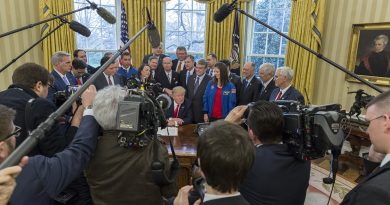Seeing a ‘Teachable Moment,’ Faculty Panel Discuss Diplomacy in Trump’s World
By Francesca Regalado
Managing Editor
Two days before the inauguration of Donald Trump as the 45th president of the United States, there was barely any room to sit in the spacious Beck Rooms when members of the School of Diplomacy’s faculty seized the opportunity to discuss the future of international relations.
“These things are what we like to call ‘teachable moments,’” said Dr. Martin S. Edwards, who spearheaded the event and moderated the panel discussion. “Not just in terms of sharing our professional toolkit to help frame ways to think about the next four years, but also in – something we’re all going to need a great deal of – modeling appropriate public discourse.”
Five professors were on the dais to deliver prepared remarks on their respective fields of expertise, then to answer questions from students, faculty, alumni, and visitors. Dr. Nabeela Alam, the School’s resident economist, warned that policies aimed at reestablishing American preeminence could create an opening for China to overtake the United States.
Trump, who ran on an economic platform of protectionism, frequently said that the United States was losing not only its preeminence to China, but also on trade deals with other countries. “By withdrawing from the TPP, the U.S. would actually be facilitating that,” Alam said about the Trans-Pacific Partnership, a trade deal among 12 Pacific Rim states looking to hedge against China’s regional economic dominance that Trump promised to withdraw from during the election campaign.
According to Dr. Alam, the United States could also stand losing to China in terms of innovative clean energy. Citing a report on The Independent that China had scrapped the construction of 85 coal power plants and was instead investing $300 billion into clean energy, Dr. Alam compared that development to Trump’s campaign promise to save the American coal mining industry. “That’s another area where China would be going ahead,” she said.
Dr. Ann Marie Murphy, an expert on Southeast Asia, warned that abandoning the United States’ allies in Asia would create a security spiral as they seek to deter not only China, but also North Korea, which has been developing an intercontinental ballistic missile. “He’s tweeted that North Korea will not be allowed to achieve this capacity, but he’s articulated no problem,” she said, adding that Trump’s antagonism of China while calling on China to step in on the North Korean issue was worrisome.
Trump has expressed that he would not be opposed to Japan and South Korea’s development of a nuclear weapons, but Fr. Brian Muzas, whose expertise is in defense systems, said Trump has made conflicting remarks that each echo a different theory of nuclear policy: selective proliferation, nuclear deterrence, or nuclear abolition.
Of the international treaties and alliances that Trump would withdraw the United States from, none has caused as much concern among Diplomacy students as recent legislation proposed by Republican senators to defund the United Nations, which would extend to U.N. peacekeeping operations and the World Health Organization. As a possible consequence, other countries might step up their contributions – and influence – to the U.N. “At that point, Congress will have to choose between principle and reality, and that reality is that they have just chosen to diminish American influence,” said Dr. Edwards, whose research is on international organizations and global governance.
Edwards, however, was optimistic. According to him, Trump’s remarks that the U.S. would be making “a lot of deals” at the U.N. in the coming years indicates that Trump, despite the Republican Party, recognizes the value of the United Nations: efficiency. “This is a place where you can speak to 193 countries on a whole range of issues,” Dr. Edwards said. Moreover, Trump will have an opportunity to lead when the United States holds the rotating presidency of the Security Council in April. Finally, he was hopeful that Trump would find common ground with Secretary-General Antonio Guterres, who, like Trump, campaigned as a reformer. If Guterres and Trump were to meet, “Guterres may just charm his socks off,” Dr. Edwards said.
Similarly, Dr. Sara Moller, whose expertise is in international security, said she was “cautiously optimistic” about NATO’s future in the Trump administration. Although Trump has referred to NATO as an “obsolete” alliance, Dr. Moller argued that NATO has never failed to protect its member states and is, in fact, a bargain for the United States. “The concerns about burden-sharing are legitimate to me. Europe has been freeriding on American taxpayers for years,” she said, but not to the extent that Trump has overestimated.
According to Moller, the United States’ $500 million contribution to NATO this year is a paltry sum compared to the country’s $583 billion total defense budget, but wealthy NATO members such as Germany and Canada indeed fall short of meeting the contribution threshold, which is 2 percent of a country’s GDP.
Beyond burden-sharing, Moller looked forward to Trump’s mid-level appointments, such as assistant secretary of defense for Europe and NATO, and to whether Trump would attend the NATO summit in Brussels this summer. She will also be observing whether Trump will push member states to coalesce around NATO, or to embrace a common defense arrangement with the European Union, which she called NATO’s “rival.”
Unlike his candor regarding the United Nations, China, the TPP, and NATO, Trump “almost ignored” Latin America during the campaign, beyond proposals to curb illegal immigration from the region. Dr. Benjamin Goldfrank, who will be leading a study abroad trip to Cuba in March, said the Trump administration would have small stakes in reinstating the embargo on Cuba, a move that would only cut off possibilities for U.S. businesses.
Problems, Dr. Goldfrank warned, would result from neglecting Latin America. “Latin America becomes a priority for the United States only when there are crises, like guerrilla movements and revolutions that are threatening to U.S. interests,” he said. The peace deal between Colombia and FARC last year marked the end of the era of guerrilla movements and revolutions, but Trump’s proposed deportation of Latin American and Caribbean immigrants would worsen regional humanitarian and economic crises and have repercussions on the United States.
The panelists each tried to end their remarks on an optimistic note, with varied degrees of success. Asked where Trump could cause the most damage, Dr. Goldfrank said that with Trump’s proposals to withdraw from the Paris climate deal and to allow oil drilling in the Arctic Ocean, the president is “more likely to cause climate destruction than nuclear destruction.”
Asked whether winning the popular vote but losing the electoral college would hurt Trump’s legitimacy in the eyes of foreign leaders, Dr. Murphy responded that the United States’ reputation is in question. “What does it say about the citizens that elected him?” she said. “Is America ever going to be a reliable ally? Is America really a proponent of liberalization?”


